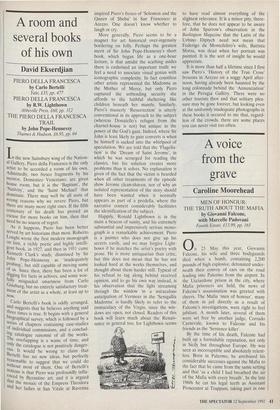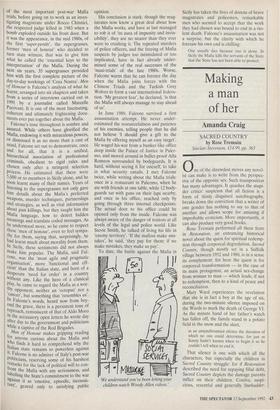A voice from the grave
Caroline Moorehead
MEN OF HONOUR: THE TRUTH ABOUT THE MAFIA by Giovanni Falcone, with Marcelle Padovani Fourth Estate, £13.99, pp. 165 0 n 23 May this year, Giovanni Falcone, his wife and three bodyguards died when a bomb, containing 2,200 pounds of high explosive, detonated under- neath their convoy of cars on the road leading into Palermo from the airport. In the Ucciardone prison in the city, where Mafia prisoners are held, the news of Falcone's assassination was greeted with cheers. The Mafia 'men of honour', many of them in jail directly as a result of Falcone's investigations, were right to feel jubilant. A month later, several of them were set free by another judge, Corrado Carnevale, known to Falcone and his friends as the 'Sentence killer'.
By the time of his death, Falcone had built up a formidable reputation, not only in Sicily but throughout Europe. He was seen as incorruptible and absolutely relent- less. Born in Palermo, he attributed his considerable successes against the Mafia to the fact that he came from the same setting and that 'as a child I had breathed the air of the Mafia with every breath'. In the late 1960s he cut his legal teeth as Assistant Prosecutor at Trappani, taking part in one of the most important post-war Mafia trials, before going on to work as an inves- tigating magistrate under Rocco Chinnici, the respected judge killed in 1983 when a bomb exploded outside his front door. But it was the appearance, in the mid 1980s, of the first `super-pentiti', the supergrasses, former 'men of honour' who decided to turn state witness, that was to give him what he called the `essential keys to the interpretation' of the Mafia. During the next six years, 35 supergrasses provided him with the first complete picture of the day-to-day workings of 'Cosa Nostra'. Men of Honour is Falcone's analysis of what he learnt, arranged into six chapters and taken from a series of interviews carried out in 1991 by a journalist called Marcelle Pacovani. It is one of the most fascinating, coherent and ultimately frightening docu- ments ever put together about the Mafia.
Falcone's tone throughout is sombre and assured. While others have glorified the Mafia, endowing it with miraculous powers, or dismissed it as no more than a cast of mind, Falcone set out to demonstrate, once and for all, that it is a unified, hierarchical association of professional criminals, obedient to rigid rules and Chosen only after a stringent selection process. He estimated that there were 5,000 or so members in Sicily alone, and he soon learnt many of their names. Years of listening to the supergrasses not only gave him details about the Mafia's preferred weapons, murder techniques, partnerships and strategies, as well as vital information about past killings, but they taught him the Mafia language, how to detect hidden meanings and translate coded messages. As he understood more, so he came to respect these 'men of honour', even to feel sympa- thy for them, saying that, surprisingly, he had learnt much about morality from them. In Sicily, these sentiments did not always make him popular. The Mafia, said Fal- cone, was the 'most agile and pragmatic organisation', more 'functional and eff- cleat' than the Italian state, and born of a desperate 'need for order' in a country Without any. Like the hero of a classical Play, he came to regard the Mafia as a wor- thy opponent, neither an 'octopus' nor a cancer', but something that 'resembles us'. In Falcone's words, heard now from bey- ond the grave, there is a persistent tone of reproach, reminiscent of that of Aldo Moro in the accusatory open letters he wrote day after day to the government and politicians While a captive of the Red Brigades. Men of Honour makes gripping reading for anyone curious about the Mafia and Who finds it hard to comprehend why the Italian state remains so powerless against it. Falcone is no admirer of Italy's post-war politicians, reserving some of his harshest lemarks for the lack of political will to con- Ir°nt the Mafia with any seriousness, and labelling the State's commitment to the war against it as 'emotive, episodic, inconsis- tant', geared only to satisfying public
opinion.
His conclusion is stark: though the mag- istrates now know a great deal about how the Mafia works, and have at last managed to rob it of 'its aura of impunity and invin- cibility', they are no nearer than they ever were to crushing it. The repeated murders of police officers, and the freeing of Mafia suspects by judges too intimidated or too implicated, have in fact already under- mined some of the real successes of the 'maxi-trials' of the late 1980s. Worse, Falcone warns that he can foresee the day when the Mafia joins forces with the Chinese Triads and the Turkish Grey Wolves to form a vast international federa- tion. 'My greatest fear', he declared, 'is that the Mafia will always manage to stay ahead of us'.
In June 1989, Falcone survived a first assassination attempt. He never under- estimated the resourcefulness and patience of his enemies, telling people that he did not believe 'I should give a gift to the Mafia by offering myself as an easy target'. He waged his war from a bunker-like office deep inside the Palace of Justice in Paler- mo, and moved around in bullet-proof Alfa Romeos surrounded by bodyguards. It is hard, without seeing it for oneself, to take in what security entails. I met Falcone twice, while writing about the Mafia trials: once in a restaurant in Palermo, when he ate with friends at one table, while 12 body- guards sat with guns on their laps nearby, and once in his office, reached only by going through three internal checkpoints. The actual door to his office could be opened only from the inside. Falcone was always aware of the danger of traitors at all levels of the legal and police world. Like Stevie Smith, he talked of living his life in 'enemy territory'. 'If the mafiosi make mis- takes', he said, 'they pay for them; if we make mistakes, they make us pay'.
To date, the battle against the Mafia in 'We understand you've been letting your children watch Woody Allen videos.' Sicily has taken the lives of dozens of brave magistrates and policemen, remarkable men who seemed to accept that the work they had chosen was bound to end in a vio- lent death. Falcone's assassination was not a surprise, but the clarity with which he foresaw his own end is chilling:
One usually dies because one is alone. In Sicily the Mafia kills the servants of the State that the State has not been able to protect.



































































 Previous page
Previous page